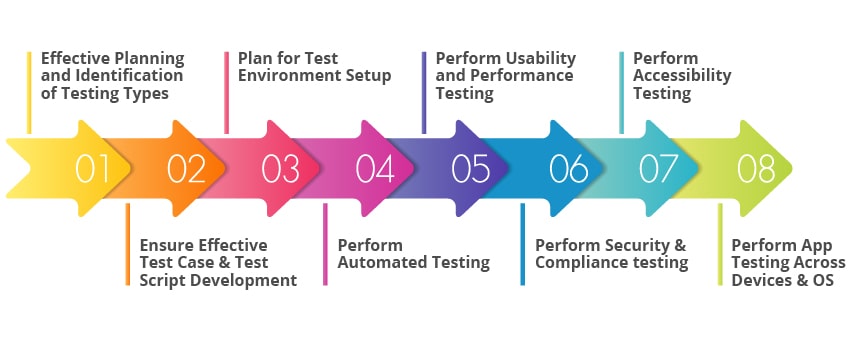Published: 07 Apr 2020
Why Should Businesses Focus on Mobile Automation Testing
Last Updated: 18 Jul 2022
It is a known fact that every business sector is today surrounded with numerous mobile apps as these mobile applications continue to be the major business enablers. All businesses continue to expand their operations by enabling mobile apps, as there has been a massive increase in the use of smartphones across the globe.
This widespread usage of these connected smart devices has actually culminated in the heavy use of mobile apps, irrespective of the industry.
Content
1. What is Mobile Automation Testing?
2. Why Should Businesses Leverage Mobile Test Automation?
3. Mobile testing automation characteristics
4. What are the Steps to Follow for Achieving an Effective Test Automation of Mobile Apps?
5. What are the most commonly used Mobile Automation Testing Tools?
6. Conclusion
A leading research analyst reports, “mobile application market to garner $311.2 Billion by 2023 with 19.32% CAGR. It has also been stated that “the global mobile app analytics market is expected to exhibit a 17.24% CAGR from 2018 to 2025 (forecast period)”, according to the latest report by Market Research Future (MRFR) owing to the pervasiveness of smartphones.
The Some of the major drivers for the global mobile application market growth includes increasing data usage, widespread internet penetration, and majorly availability of different range of smartphone devices that are widely used to download loads of mobile applications.
Significantly, it needs to be stated that not all mobile apps have garnered good support from mobile users across the globe. Only some of the mobile applications have become widely used and continue to edge more users with lot of downloads while many apps do not gather much user base.
The major reason for mobile users to patron some mobile apps are the speed with which the app loads, the way various features are arranged and the most important amongst others is the performance and the user experience (UX) it delivers.
On the contrary, if the mobile apps are defective, mobile app users get annoyed using them due to the bugs and refrain from using them. They might even move to their nearest competitor in search of better mobile apps.
Thus, it is wisely said that mobile apps require effective testing to ensure great usability and performance. Therefore, businesses should leverage mobile automation testing to ensure the apps perform well and deliver great user experience (UX).
What is Mobile Automation Testing?
Software testing is the main process involved in the mobile application development, where every mobile app developed for handheld devices is tested for various app features. These includes its loading time, user experience, functionality usability, accessibility, security and performance of the apps across browsers, operating systems and numerous mobile devices.
Basically, mobile app testing is done using a variety of mobile automation testing tools to ensure the apps are flawless and perform well under varying load conditions. This type of mobile app testing using mobile automation testing tools is named as mobile automation testing. Leveraging mobile app automation testing, businesses can be assured that the mobile app is bug free and can be released into the market place (i.e. app store or play store).
Why Should Businesses Leverage Mobile Test Automation?

It is a known fact that across enterprises of all sizes, due to large number of smart phone users, mobile apps have fuelled the growth in business operations along with delivering better customer services. Evidently, a mobile app user decides which app to download based on the purpose of the task they wish to accomplish along with the ease of its usage.
Today, with millions of mobile apps available, the app ratings and reviews also play an important role for a new user to download mobile apps. Hence, it is primarily important that the mobile app automation testing should be taken up during the mobile app development phase to ensure the app is fully tested using effective mobile automation testing tools. There are various automation tools used for mobile application testing to ensure flawless apps.
Businesses should leverage mobile testing automation to achieve below characteristics:
App Functionality:
This sort of mobile app functionality testing ensures the mobile app functions as specified in the design document for various specifications.
App Performance:
This sort of mobile performance test automation assesses app responsiveness, operating capacity, scalability and readiness of the app, and how it performs with varying loads of users.
App Security:
The security testing verifies data integrity, storage security issues, significance of any tainted inputs and also checks the security of activity logs.
App Usability:
App usability automation testing is very importanttoday as mobile apps that deliver great usability are preferred more by users. Hence, this accessibility test automation ensures that users are able to perform the intended tasks on the app satisfactorily.
App Accessibility:
Today, it is a mandate that the apps should be accessible to differently abled population to ensure their easy access and usage. There are certain accessibility norms and regulations that should be adhered to ensure standardized accessibility to all users. Hence accessibility test automation should be taken up for mobile apps.
Across browsers, OS, various Mobile Devices:
Mobile test automation with various test automation tools should be taken up to ensure the apps work effectively across different browsers, operating systems and various mobile devices to ensure its easy accessibility for varied range of users.
In addition to all the above, businesses get these major benefits with effective mobile test automation such as:
i) Increased test efficiency,
ii) Increased test coverage, and
iii) Quicker time to market.
It also ensures cost effectiveness and delivers quicker ROI with flawless mobile apps achieved. Hence, businesses should leverage mobile test automation tools for mobile application testing to ensure high-performing apps.
What are the Steps to Follow for Achieving an Effective Test Automation of Mobile Apps?

Creating a mobile app with all features embedded in it is not enough as effective mobile test automation strategy should be followed to ensure mobile app success. The following are the steps to be followed for mobile application testing process to ensure its success
Step 1: Effective Planning and Identification of Testing Types:
It is essential that proper planning by choosing target devices to test the mobile apps should be taken up. Check out whether the mobile app is native, hybrid or mobile web.
Proper planning should also involve whether the app requires front-end testing along with back-end testing. It is also essential to classify testing types and determine which functional requirements should be tested.
Selection of devices for testing with different sizes should be taken up to ensure better app testing outcomes.
Step 2: Ensure Effective Test Case & Test Script Development:
It is essential to develop the test cases for every function of the application. Special care should be taken to include battery usage, app speed, memory, etc. Automated test scripts should be developed and reusable automation test scripts can be changed according to the project requirements.
Step 3: Plan for Test Environment Setup:
In this step, it is important to download, install and configure the application on the testing device to set up the test environment. It is also necessary to ensure the test version of the app is established before starting the actual testing process.
Automation testing is performed with mobile test automation tools like Appium, Selendroid, etc. based on the application under test of either android or iOS. Basic functions are tested to ensure there are no glitches or faults.
Step 5: Perform Usability and Performance Testing:
Once the basic functions are tested then the usability testing should be taken up to ensure good user experience is achieved. Performance testing using mobile performance testing tools should be taken up to ensure the app deliver flawless performance even when numerous users login at the same time.
Step 6: Perform Security & Compliance testing:
The application is tested to ensure that the app is secure and does not have any data leaks. This is done by authenticating SQL injection, session hijacking, etc. Compliance testing should also be taken up.
Step 7: Perform Accessibility Testing:
Today, with numerous users accessing mobile apps globally, it is also essential to perform accessibility testing to ensure the mobile app is made accessible to disabled population by ensuring compliance with certain accessibility norms.
Step 8: Perform App Testing Across Devices & OS:
This is a very important step as all the test scripts should be executed in different devices and OS to ensure the app performs well with different devices, and operating systems.
What are the most commonly used Mobile Automation Testing Tools?
Functionality testing:
Appium (both Android & iOS), Selendroid (Selenium for Android), Robotium (Android)
BrowserStack, Browsera
Automated UI testing:
TestComplete
Native and Hybrid Apps (iOS & Android) testing:
Calabash, Testdroid, MonkeyTalk
WebLOAD
Android & iOS testing Platform:
SeeTest
Conclusion:
For all businesses today, mobile apps continue to be the major means of enabling business. There are millions of mobile apps available in the market, but user’s patron only those apps that load quickly, deliver great user experience, show flawless performance under varying loads and with security features survive the competition.
But, for mobile apps to perform well and deliver great UX, businesses must leverage mobile test automation services by next-gen testing services. These service providers follow best practices of mobile test automation and its strategy to ensure their mobile apps deliver great user experience and thus are assured to gain large visibility and get more users.